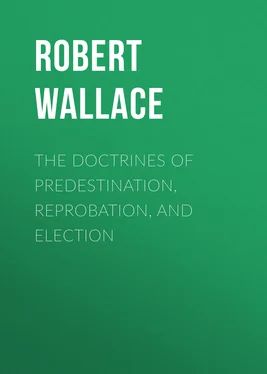Robert Wallace - The Doctrines of Predestination, Reprobation, and Election
Здесь есть возможность читать онлайн «Robert Wallace - The Doctrines of Predestination, Reprobation, and Election» — ознакомительный отрывок электронной книги совершенно бесплатно, а после прочтения отрывка купить полную версию. В некоторых случаях можно слушать аудио, скачать через торрент в формате fb2 и присутствует краткое содержание. Жанр: foreign_prose, foreign_religion, Философия, foreign_psychology, foreign_antique, на английском языке. Описание произведения, (предисловие) а так же отзывы посетителей доступны на портале библиотеки ЛибКат.
- Название:The Doctrines of Predestination, Reprobation, and Election
- Автор:
- Жанр:
- Год:неизвестен
- ISBN:нет данных
- Рейтинг книги:4 / 5. Голосов: 1
-
Избранное:Добавить в избранное
- Отзывы:
-
Ваша оценка:
- 80
- 1
- 2
- 3
- 4
- 5
The Doctrines of Predestination, Reprobation, and Election: краткое содержание, описание и аннотация
Предлагаем к чтению аннотацию, описание, краткое содержание или предисловие (зависит от того, что написал сам автор книги «The Doctrines of Predestination, Reprobation, and Election»). Если вы не нашли необходимую информацию о книге — напишите в комментариях, мы постараемся отыскать её.
The Doctrines of Predestination, Reprobation, and Election — читать онлайн ознакомительный отрывок
Ниже представлен текст книги, разбитый по страницам. Система сохранения места последней прочитанной страницы, позволяет с удобством читать онлайн бесплатно книгу «The Doctrines of Predestination, Reprobation, and Election», без необходимости каждый раз заново искать на чём Вы остановились. Поставьте закладку, и сможете в любой момент перейти на страницу, на которой закончили чтение.
Интервал:
Закладка:
Although we do not know where and when Pelagius was born, nor the place and time of his death, we have reliable information on these points regarding Augustine. He was born at Tagaste, a town in north Africa, on 13th Nov., a.d. 354. He was the child of many prayers by his devoted mother Monica. The early portion of his life was spent in idleness and dissipation, but he was at last converted in a somewhat remarkable manner. He turned over a new leaf in his moral life, and became a most devoted Christian. Although considered inferior to Jerome (his contemporary) as regards Biblical criticism, he was a man of genius, and a strong controversialist. He contended against the Donatists, the Manichæans, and the Pelagians. When the Vandals were besieging Hippo, he died on the 28th of August, a.d. 430, in the 76th year of his age. No father of the early Church has exercised a greater influence upon theological opinion than he has done.
The system now known as Calvinism should be designated “Augustinianism,” Augustine being, as remarked, the real author of the system, and not the Genevan divine. Regarding the central tenets of his creed, it is said: “He held the corruption of human nature, and the consequent slavery of the human will. Both on metaphysical and religious grounds he asserted the doctrine of predestination, from which he necessarily deduced the corollary doctrines of election and reprobation; and, finally, he supported against Pelagius, not only these opinions, but also the doctrine of the perseverance of the saints,” ( Ch. En. , Aug.) Besides introducing a new theological system, Augustine put his imprimatur upon the burning of heretics. When the magistrate Dulcitius had some compunctions about executing a decree of Honorius, Augustine wrote to him and said, “It is much better that some should perish by their own fires, than that the whole body should perish in the everlasting fires of Gehenna, through the desert of the impious dissension” ( Ch. En. , Aug.) Calvin therefore could not only claim the authority of Augustine for his dogmas, but he might have claimed him also as justifying the burning of Servetus. But this by the way.
With the voice of the Fathers against him, and, as we think, unwarranted by the light of philosophy and the true interpretation of Scripture, how came it about, it may be asked, that Augustine adopted the system which should be called by his name? The true answer to this will be found, we apprehend, in a variety of considerations. His early dissipated life, his nine years connection with Manichæism, the extreme statements of Pelagius, his own strange conversion by hearing, when weeping and moaning under a fig-tree, a young voice saying quickly, “ Tolle lege, tolle lege ” (take and read, take and read), and which he took as a Divine admonition; these, combined with the commotion of the times, would lend their influence to the position he came to occupy. His system, whilst it accords glory to God, is one-sided, by ignoring the function man has to perform in applying the remedial scheme.
Although Pelagius had got many to espouse his opinions, yet his tenets were again and again condemned by the councils of the Church. The controversy, however, very soon diverged from strictly Pelagian lines, and entered upon a new track—viz., that of Semi-pelagianism, to which is closely allied the principles advocated by the Evangelical Union of Scotland. From extremes there is generally a recoil, and this was the case as regards Augustinianism. Certain monks at Adrumetum drew conclusions from the system which, whether they are admitted or not, are its logical outcome. They said, “Of what use are all doctrines and precepts? Human efforts can avail nothing, it is God that worketh in us to will and to do. Nor is it right to reproach or to punish those who are in error, and who cannot sin, for it is none of their fault that they act thus. Without grace they cannot do otherwise, nor can they do anything to merit grace; all we should do, then, is to pray for them” (Neander, Vol. IV., p. 373). Augustine endeavoured to neutralise these opinions by writing two books explaining his views. Regarding these answers, Neander observes, “But such persons,” as the monks, “must rather have found in this a further confirmation of their doubts.”
Whilst the monks of Adrumetum drew natural conclusions from the dogmas of Augustine, there came determined opposition to the new creed. It came from the south of France. John Cassian, who had been a deacon under Chrysostom, had established a cloister at Massila (Marseilles), and had become its abbot, entered the lists against the Bishop of Hippo. He departed from the opinions of Pelagius regarding the corruption of human nature, and he recognised “grace” as well as justification in the sense of Augustine. But he widely differed from him, as will be seen from the summary of Semi-pelagianism given by Buck. It is as follows: “(1.) That God did not dispense His grace to one man more than another in consequence of an absolute and eternal decree, but was willing to save all men if they complied with the terms of the Gospel. (2.) That Christ died for all mankind. (3.) That the grace purchased by Christ, and necessary to salvation, was offered to all men. (4.) That man before he received this grace was capable of faith and holy desires. (5.) That man was born free, and consequently capable of resisting the influence of grace, or of complying with its suggestions.” Buck remarks, “The Semi-pelagians were very numerous, and the doctrine of Cassian, though variously explained, was received in the greatest part of the monastic schools in Gaul, from whence it spread itself far and wide through the European provinces. As to the Greeks and other Eastern Churches, they had embraced the Semi-pelagian doctrine before Cassian.” Yet when, as in 1843, similar opinions were proclaimed in Scotland, they were everywhere met with the cry of “New Views,” although they had been held so extensively 1400 years before! So much for ignorance.
The name “Semi-pelagians” was not assumed by the party, lest they should be held as maintaining the dogmas of Pelagius; neither was it given until long after the early heat of the controversy. Their opponents still stigmatised them as Pelagians, although they had departed from the system advocated by the British monk.
The controversy continued to occupy the mind of the Church during the latter part of the fifth and beginning of the sixth centuries. In a.d. 475 a synod held at Arles sanctioned the views of the Semi-pelagians, and compelled the presbyter Lucidus, who was an earnest advocate of Augustinianism, to recant. Another synod, held at Lugdunum in the same year, put also its imprimatur upon them. But there was not complete agreement, and the divines who had been banished by the Vandals from northern Africa held a council in a.d. 523, and under their auspices Fulgentius of Ruspe composed a defence of Angustine’s views; (Kurtz, p. 213)
For a considerable time after this the controversy may be said to have remained quiet, but broke forth with great fury in the ninth century. Gottschalk, the son of a Saxon count, had been dedicated by his parents to the service of religion, and in due course entered the monastery of Fulda. He did not take to cloister life, and petitioned an assembly held at Metz to be released from his monastic vows. His request was granted, but Rabanus Maurus, who was the abbot, appealed to Lewis the Pius, and endeavoured to show that all oblati (lay brethren dedicated to the service of the Church) were bound to perpetual obligation. Lewis revoked the decision of the assembly, and Gottschalk had to go back to cloister life, which he did by entering the monastery of Orbais. Here he became an ardent student of the writings of Augustine, and sought to propagate his views. “He affirmed a prœdestinatio duplex , by virtue of which God decreed eternal life to the elect, and the elect to eternal life; and so also everlasting punishment to the reprobate, and the reprobate to everlasting punishment, for the two were inseparably connected” (Neander, Vol. VI., p. 180).
Читать дальшеИнтервал:
Закладка:
Похожие книги на «The Doctrines of Predestination, Reprobation, and Election»
Представляем Вашему вниманию похожие книги на «The Doctrines of Predestination, Reprobation, and Election» списком для выбора. Мы отобрали схожую по названию и смыслу литературу в надежде предоставить читателям больше вариантов отыскать новые, интересные, ещё непрочитанные произведения.
Обсуждение, отзывы о книге «The Doctrines of Predestination, Reprobation, and Election» и просто собственные мнения читателей. Оставьте ваши комментарии, напишите, что Вы думаете о произведении, его смысле или главных героях. Укажите что конкретно понравилось, а что нет, и почему Вы так считаете.












